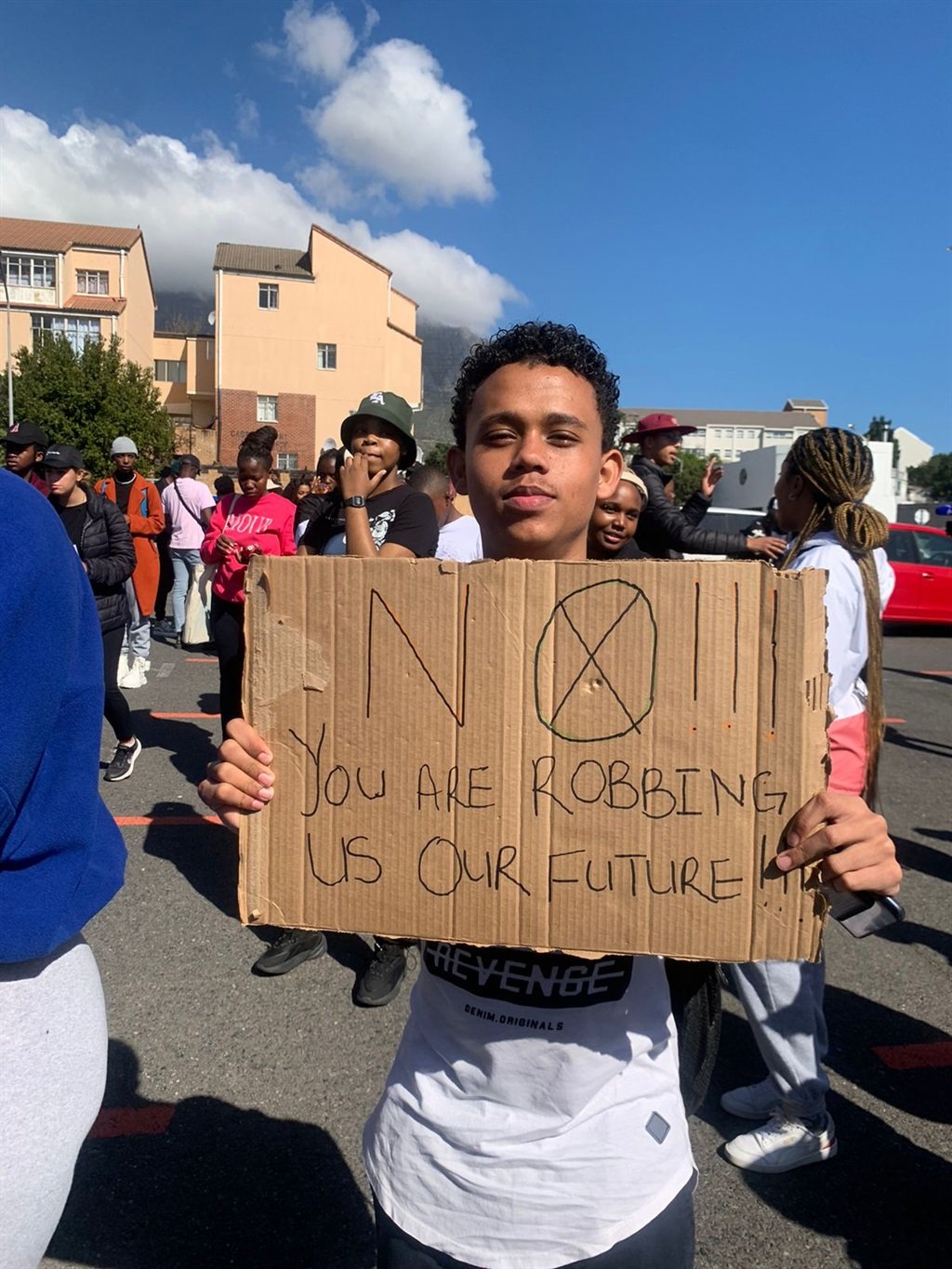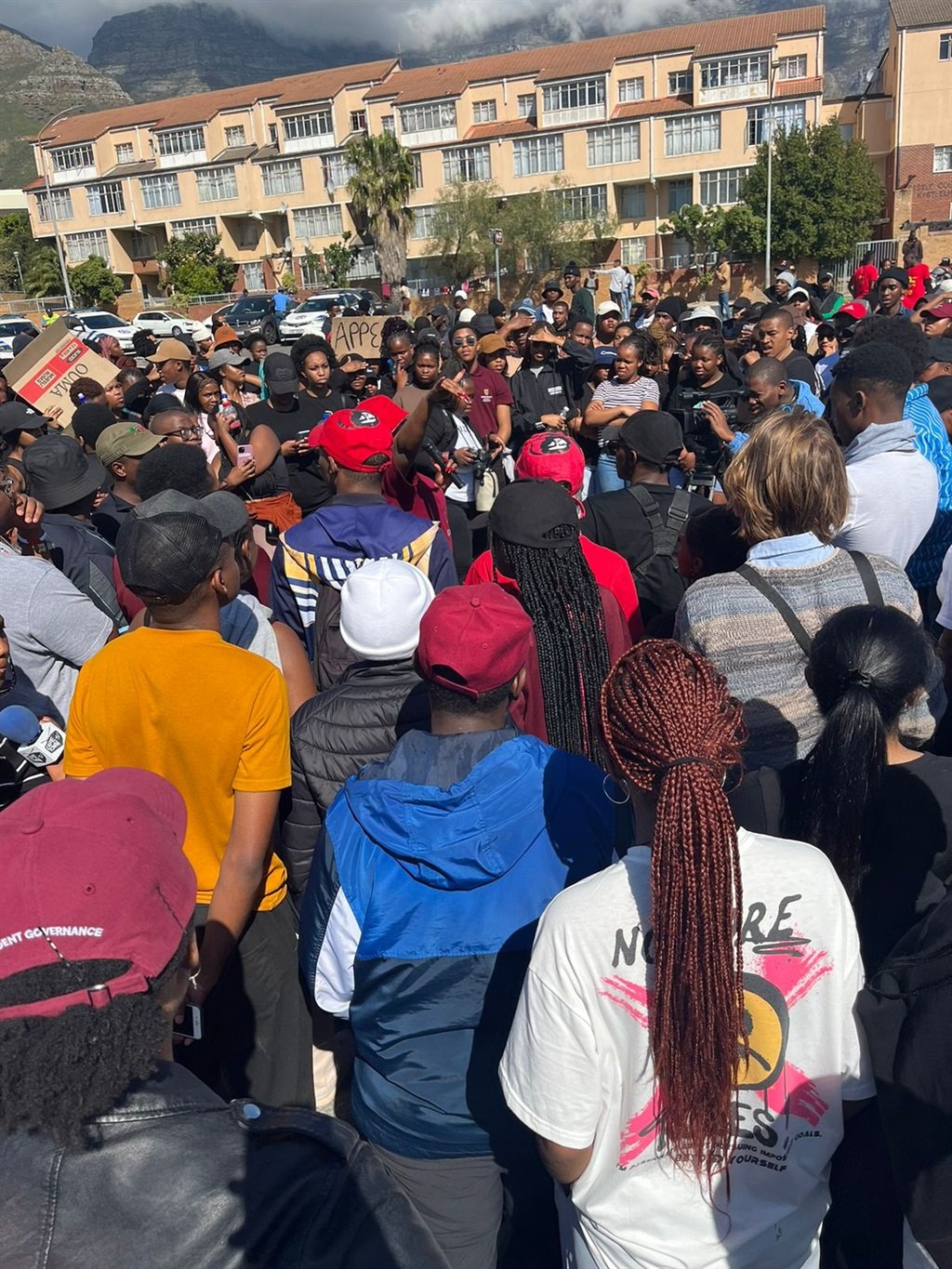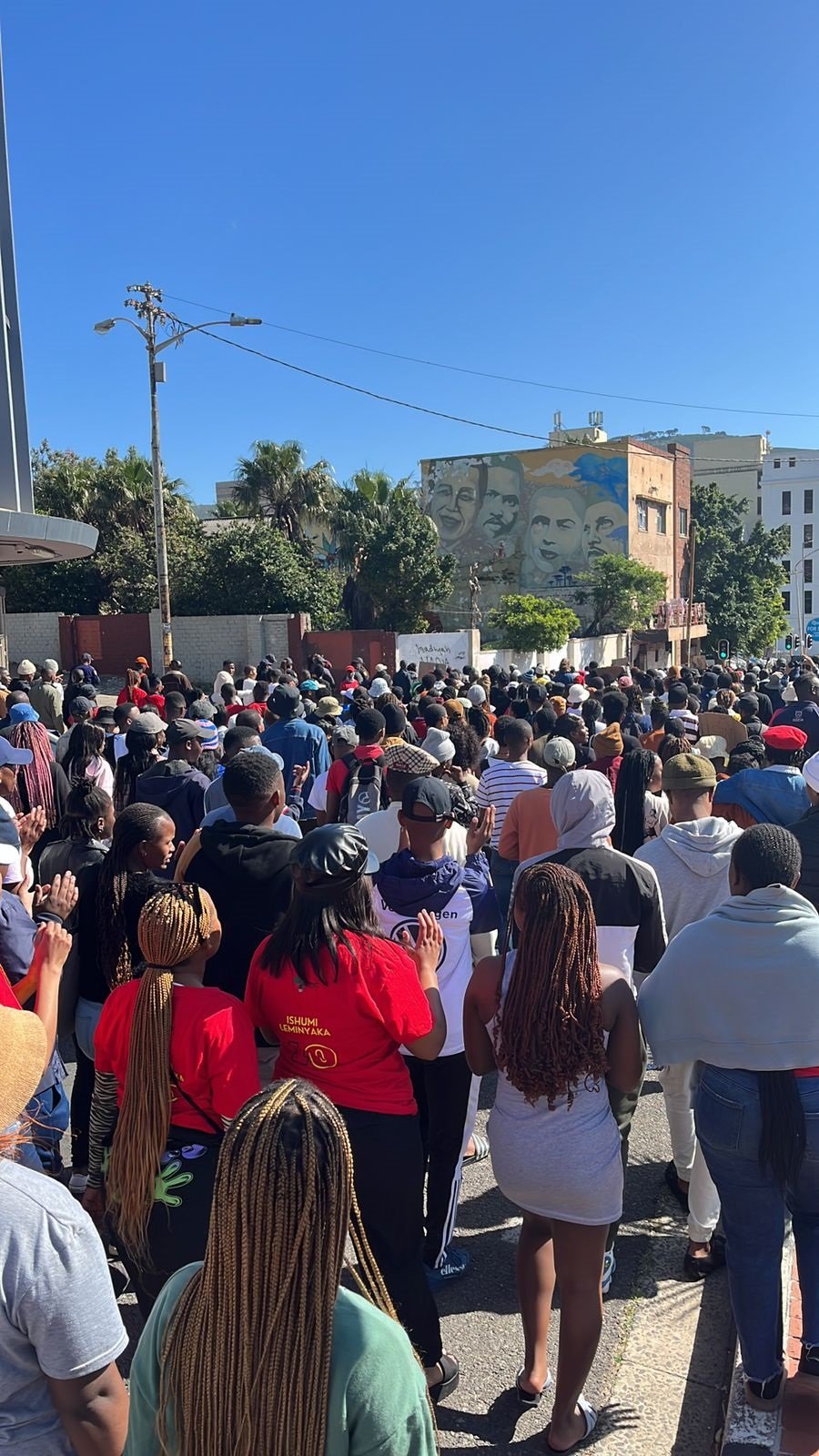
- University students marched to Parliament on Wednesday.
- They handed over a memorandum of their concerns with the new NSFAS payment system.
- The CEO of NSFAS has been placed on a leave of absence.
Hundreds of university students in the Western Cape marched to Parliament on Wednesday to raise their dissatisfaction with the direct payment system implemented by the National Student Financial Aid Scheme (NSFAS).
Students from Stellenbosch University, University of the Western Cape, Cape Peninsula University of Technology and the University of Cape Town gathered in their numbers to hand over a memorandum.
A member of the Portfolio Committee on Higher Education accepted the memorandum and told students they would respond in 24 hours.
This comes as NSFAS announced on Wednesday afternoon that its CEO, Andile Nongogo, would take a leave of absence while the scheme investigates allegations against him.
The chairperson of the NSFAS board, Ernest Khosa, said:
The allegations relate to his work with the Services SETA and how this may relate to unacceptable conduct in the awarding of bids at NSFAS. In the interest of the image of NSFAS, the Board has resolved to investigate the allegations with a particular focus on the direct payment project. The Board wishes to reiterate that this investigation is no pronouncement of guilt against the CEO, but an objective effort to determine the veracity of the allegations.
Stellenbosch SRC’s vice chairperson, William Sezoe, said students “were very unhappy” about the third party company that had been appointed to pay out allowances to students.
“As students, we are unhappy that the companies being used for the paying out of allowances are not registered and have no experience in dealing with students of such a magnitude who rely on the funds from NSFAS to complete our studies,” said Sezoe.
He said more than 600 students from Stellenbosch University had been defunded.
“No explanation was given to those students as to why they had been defunded. The students rely wholly on the funding they should be receiving and to stop funding without notification or explanation is unacceptable,” said Sezoe.
He added that the SRC approached the Public Protector’s office to investigate how the third party company got the tender.
WATCH | ‘Our studies can’t wait’: Students march to NSFAS office in Cape Town to demand action
In a letter seen by News24, the SRC asked the Public Protector to look into the bank charges which students had to pay “just to access their allowances”.
The University of Cape Town SRC’s deputy secretary-general, Yondela Mathabaha, said the protest was peaceful and that students were hopeful a response would be received within the 24-hour timeframe.
“We came here to hand over the memorandum. We have raised our issues and concerns that we face as students. It’s now up to NSFAS and the higher education minister to address our pleas,” said Mathabaha.
In the memorandum, the students said it was imperative there be transparent consultations between the Department of Higher Education and SRCs to ensure representation and inclusivity in policy decisions.
Part of the memorandum read:
NSFAS embodies so many questionable practices, and there have been many alarming findings, a commission of inquiry must be convened. Decentralise NSFAS for swift solutions. There should be an immediate review of the defunding of students. Embrace and empower the missing middle, dismantle the NSFAS accommodation cap.
The students said there should be consistency in NSFAS’ funding criteria and they rejected the direct payment mandate.
Meanwhile, the board of directors of Universities South Africa (USAf) expressed deep concern about challenges with NSFAS.
Since the beginning of the academic year, students from different universities protested nationwide to raise concerns about NSFAS’ new payment system, eZaga, and payout delays.
The students also complained about the defunding of 45 000 NSFAS beneficiaries.
READ | NSFAS acknowledges ‘teething issues’, sets record straight after defunding over 45 000 students
Last week, the scheme acknowledged that it had teething problems.
Khosa said the scheme was “perturbed, to say the least”, about the protests and disruptions at universities and TVET colleges.
The CEO of USAf, Phethiwe Matutu, said universities faced key challenges in the administration of new NSFAS initiatives.
“The defunding of students in the middle of the academic year has caused challenges for students and universities. NSFAS has provided neither the reasons for the revocation of students’ bursaries nor a mechanism of appeal for the defunded students.
“This is a source of frustration among students and staff alike and instability at universities,” Matutu said.
She said the board had taken issue with the NSFAS’ decision to disburse student allowance directly to the students, out of concern that the scheme’s implementation system had not been tested at universities.
Matutu said:
The direct payment poses a risk of NSFAS continuing to pay deregistered students or those who have stopped attending classes, given that the universities’ databases are not integrated with that of NSFAS.
According to the scheme’s latest reports, 14%, or more than 50 000 students, were still to be onboarded, resulting in undue pressure on students who must pay rent to their landlords.
“From the end of June, the USAf board of directors has made numerous attempts to meet with [Higher Education Minister] Blade Nzimande to resolve these issues.
“However, even though meetings had been agreed to by the ministry and the department, they are yet to materialise. We believe the minister should urgently intervene in this situation,” Matutu said.
She said in the interest of the smooth continuation of the academic project, USAf appealed for urgent engagement with the minister and NSFAS to resolve the issues decisively.
ALSO READ | Instant defunding of students avoids ‘wrongful and illegal allocation of funds’ – NSFAS
Meanwhile, the Organisation Undoing Tax Abuse (OUTA) called for Nongogo to not be allowed near the public purse.
The organisation said it had been investigating corruption and maladministration in the Services Sector Education and Training Authority (SSETA) since 2018.
Its latest investigation into the entity had uncovered an extremely overpriced rebranding campaign that cost taxpayers R37 million.
The invoices were allegedly signed off by Nongogo, the Services SETA CEO at the time.
ALSO READ | In limbo: Students claim NSFAS changed statuses from ‘approved’ to ‘rejected’
Last week, OUTA released an updated investigation report on NSFAS’ direct payment system.
The report detailed the differences between the current tender awarded to Coinvest Africa, Tenet Technology, Ezaga Holdings and Norraco Corporation and the two cancelled tenders for a similar service (direct payment of student allowances).
According to the report:
One of our findings is that the cancelled tenders had 20 mandatory requirements that had to be met by service providers, while the current tender has only five mandatory requirements. NSFAS has not published the agreed fee structure with the service providers. Our report will show that NSFAS was determined to adopt a monthly fee of R102.35 when the tender was awarded. After pressure from students and civil society, the monthly fee was decreased to R12. Still, it seems the transaction fees increased drastically.
The organisation has proposed that Nzimande instruct the NSFAS board to temporarily put aside the contracts until such time the Special Investigating Unit and the Public Protector investigations are completed.
The higher education department has been approached for comment, and this will be added if received.
.







